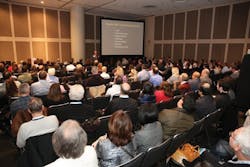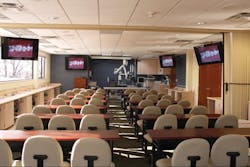Finding optimum continuing education
Q:
I recently graduated from dental school, and I thought I received a good dental education. After two years of practice, I have concluded that I had just enough information and experience from dental school to start to learn how to practice in the "real world." Many of my colleagues get much of their continuing education (CE) on the internet. That seemed logical to me until I noted that most of that education is funded by companies or taught by individual dentists who express their opinions about products or techniques. I have taken numerous CE courses, some of which were helpful and some where I received almost nothing but show-and-tell cases accomplished by the speaker without any significant supporting research or clinical experience. Where should I go or what should I do to get reliable, research-based, practical clinical education that is provided by those who actually do what they are teaching?
ALSO BY DR. GORDON CHRISTENSEN |Cementing zirconia restorations
A:
I often hear this same frustrating question from both new and mature dentists. My career has included presenting CE thousands of times in almost every venue you can imagine. In other words, I have seen and participated in almost every type of CE. I will answer your question based on that broad experience.
There are numerous ways to receive CE, and I will list and discuss them in a logical order but not in any perceived order of their value to you. Please remember that within each of the categories, there can be good and bad CE.
Self-education
Depending on your self-motivation, you can accomplish excellent CE in this manner. Many of the most well-recognized individuals in any field have educated themselves in this manner. The following are some of the concepts of self-education.
• Journals or magazines. An article in a reputable journal written by an individual you have previously found trustworthy can be a valuable resource. Some of the magazines such as Dental Economics, Dentistry Today, or Inside Dentistry carry articles that are often more useful to you and your patients than the so-called peer-reviewed journals. In my experience, some of the peers do not know the subject they are reviewing, and often they are nonpractitioners. I suggest being careful with your selection of journals and magazines!
• Judging articles. Use internet sources to evaluate articles. Use the websites PubMed, Google Scholar, Cochrane Collaboration, and others to locate articles on any subject of your interest. Don't trust everything you read, but judge the sources, look at several articles on any given subject, combine the article conclusions with your own clinical observations, and make appropriate changes in your practice. The Cochrane Collaboration provides meta-analyses, which combine the evidence present in selected articles on a given subject.
• Your experiences. Don't underestimate your own clinical experiences with techniques, materials, and devices. Clinical observation is an extremely important part of evidence-based practice, as stated by Dr. David Sackett, the physician who was instrumental in getting that phrase into our vocabularies. In addition to reading the conclusions in the scientific literature, watching the clinical behavior of any material, technique, or concept over a substantial time period substantiates or negates the literature. Clinical observation is the "final test" of any concept. In our research group, Clinicians Report Foundation, we have more than 400 private practitioners who are our clinical evaluators. We often find that their clinical observations provide conclusions diametrically opposed to our own "scientific" studies. you are the final judge of anything you are considering to add or subtract from your practice.
• High-quality video presentations. I have been involved in this educational concept for several decades and have made more than 1,000 videos on diverse subjects. However, you have undoubtedly determined that all videos are not equal. Some are made with a smartphone with little thought or planning. Others have a modicum of production and planning, and some are professionally made, edited many times, and- importantly-discontinued as they become out of date. Some videos are just still slides and others show actual procedures being accomplished by a clinician. I see many videos on the internet that should have been removed several years ago. Take care to search for a date when the video was posted. I strongly suggest that you use only videos from sources you trust, made by experts and backed by research. In my opinion and long experience, high-quality videos are among the most adequate self-education methods you can obtain.
ALSO BY DR. GORDON CHRISTENSEN | Making decisions on clinical topics
Courses from various sources
Hands-on courses have been proven to be more effective in changing behavior than courses that are lecture only (figures 1-5). Both are available in most of the following categories:
Figure 1: Large-group seminar courses can be extremely valuable, but participants must implement what they learn into practice soon after they attend the course or the content is forgotten.
Figure 2: Small seminars with live demonstrations allow observation of live patient care. These can be augmented with participants actually doing whatever they are learning.
Figure 3: Hands-on courses are at the top of the learning experience. This specimen was used in a periodontal course.
Figure 4: A cruise can be a wonderful, contemplative retreat as well as a great learning experience.
Figure 5: I attended a motorcycle dental course with a few hours of seminar each day. The variety of venues for these types of courses is unlimited, and the tax deduction you receive is an additional benefit.
• Study clubs. I have been involved actively in study clubs as a mentor and as a participant for several decades. Check with members of clubs in your area and join those that interest you. The information gained in study clubs, the fellowship that is available, and the opinions of your peers are invaluable. Our own Gordon J. Christensen International Study Club includes me coming into your office on the internet every week (52 times per year) with the question of the week answered from research at Clinicians Report Foundation. Information is available at (800) 223-6569 or pccdental.com.
• Independent CE sponsors. Groups such as the Pankey Institute, the Dawson Academy, Las Vegas Institute for Advanced Dental Studies, our own Practical Clinical Courses, and many others recruit only well-known, proven, reputable teachers. This type of well-organized and conducted CE is excellent.
• Local dental societies. Some local dental societies sponsor well-planned, high-quality courses. If your local society is sponsoring competent speakers in your geographic area, these courses will contribute to your CE needs, and the profit obtained from tuition can be a source of revenue for society needs and projects. Some societies are fearful of the financial risk of this concept, but it is highly successful in many societies in which I have spoken.
• State, national, and international dental society meetings and courses. The larger societies can usually afford the risk of hiring well-known speakers. Attend these meetings! The fellowship you gain is an additional benefit to the clinical messages you hear. Often, you gain as much by talking to your peers as the information you gain from the courses. A further benefit is potentially even more important. Use these courses, which are usually held in hotels or convention centers, as personal retreats. Use some of the time to get your mind together relative not only to your practice, but also regarding your family, community, religion, self, or any other need in your personal life. I do this several times each year and find that I am refreshed both mentally and physically when I return to the home base.
• Dental schools. Some schools offer excellent courses, but be selective. Seek out courses of interest to you in schools that include speakers who are known to be experienced, practical teachers who actually do what they are teaching.
• Study/recreation courses. You have an opportunity to receive both great education as well as some vacation time while you are on a cruise, skiing, golfing, fishing, motorcycling, or myriad other activities.
• Courses sponsored by commercial manufacturers are frowned upon by some. If you are interested in a given product or concept, these are often excellent sources of information. Just weed out the obvious commercial bias.
Summary
This brief article includes my personal, experienced opinions on how to obtain quality, practical CE that is related to your personal needs and the needs of your patients. My opinions and observations are based on my thousands of encounters with CE in every possible type of venue and every topic in dentistry. Only you can determine your CE needs by analyzing your personal interests and the competency of your skills in those areas. Only you can find the courses you feel are most reliable. Excellent CE is available, but you have to seek it out.
In this monthly feature, Dr. Gordon Christensen addresses the most frequently asked questions from Dental Economics readers. If you would like to submit a question to Dr. Christensen, please send an e-mail to [email protected].
Additional educational information
As usual in this column, I provide some additional suggestions for you. As you have read in this article, I support videos, streaming, and hands-on courses as among the very best CE education you can obtain. The following are just a few of our most recent popular videos and courses:
• One-hour video - "Ergonomics - Reduce or Eliminate Pain from Your Practice Day" - Item V4776
• One-hour video - "Treating the Aging Population - A Frustrating Challenge" - Item V4777
• One-hour video - "Drugs, Bugs, and Dental Products: What to Prescribe!" - Item V3968
• Two-day hands-on course in Utah - Restorative Dentistry 2 (Fixed Prosthodontics) - October 14-15, 2016
• Twenty-three short patient-education videos - on almost every area of dentistry, either separate or as a series, providing patient information and informed consent and administered by staff - Items DP50 and DP51i
Gordon J. Christensen, DDS, MSD, PhD, is a practicing prosthodontist in Provo, Utah. He is the founder and director of Practical Clinical Courses, an international continuing-education organization founded in 1981 for dental professionals. Dr. Christensen is a cofounder (with his wife, Rella Christensen, RDH, PhD) and CEO of Clinicians Report (formerly Clinical Research Associates).






